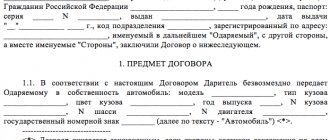Extract from the house register of a private house: features
Previously, the house register had to be kept on the basis of the FMS Order of September 11, 2012 No. 288 “On approval of the Administrative Regulations...”. Now it has lost force, and Order No. 984 of the Ministry of Internal Affairs of Russia is in force instead. No law contains the concept of a “house book,” but in fact this document is in almost every household.
The house book is a kind of passport of the house. It reflects information about owners and registered citizens. It is kept by the owners. But now, in order to obtain information about the people registered in the premises, not an extract from the house register is issued, but a certificate in Form No. 9.
Sample certificate
Consultation on document preparation
Take the survey and a lawyer will tell you for free how to avoid mistakes in an apartment purchase and sale transaction in your case
Can the owner leave the house if there is no house register?
The house register was kept by the owner of a private house, who was its owner, and if the house was in shared ownership, then by all shareholders. It reflected all the facts of registration and deregistration of residents from the household during the period of existence of the building.
The number of residents registered at a particular address significantly affects the amount of utility bills.
The form of the house register was determined.
Although this document used to be included in the list of things required for registration and deregistration, its absence could not prevent the owner from registering from his own home without a house register. After 2021, this document is no longer needed.
There are 2 ways to do this:
- Auto.
- Ordinary.
In the first case, there is a procedure in which extract and registration are carried out simultaneously with filling out applications in Form No. 6 for deregistration and registration.
In addition to the two statements, the owner must provide the UVM inspector with:
- passport;
- birth certificate of children under 14 years of age, and if children are over 14 years of age - their passports;
- title documents for home ownership: certificate of inheritance, purchase and sale agreement, deed of gift, and so on;
- certificate of title of the property owner changing the registration;
- completed departure form.
The migration department will tell you how to leave a private home in the usual way and will issue you a letterhead application form for deregistration without a house register. It contains the following information:
- name of the selected authority of the Department of Migration;
- personal data of a citizen who is leaving a private home;
- the address from which the citizen is checking out;
- new address;
- passport details;
- date and signature.
Is it possible to register a private house without a house register or deregister it?
To check out from a private home, you do not need a house register. It is not included in the approved list of mandatory documents. A certificate in Form No. 9 may be needed to sell real estate, apply for benefits, resolve legal disputes, and obtain a mortgage.
If the Department of Internal Affairs of the Ministry of Internal Affairs refuses registration at the place of residence, citing the lack of a house register, you must request a written refusal and appeal through the head or in court.
Permission to demolish a private house on your own site
Recognition of a private house as unsafe and subject to demolition
What is the price?
The financial side of being discharged from a private home in favor of those being discharged. There is no need to pay anything, since deregistration and registration are free.
Expenses for leaving home:
- execution of a power of attorney by a notary;
- forced deregistration through the court - if the situation has reached a dead end and there are no other ways to deregister;
- re-registration of title documents;
- obtaining a duplicate of the death certificate (if lost).
Sometimes it happens that registrars offer paid services for filling out applications. The situation is ambiguous - on the one hand, they have no right to demand money from you, but on the other hand, filling out an application can be an additional service. It is much better to fill out the form yourself. Before doing this, read the forms on our website or get advice from a lawyer.
How to discharge a minor from a private home?
It is much more difficult to remove a minor from home than an adult. There are a number of rules to consider:
- The place of residence of a child under 14 years of age is the place of residence of the parents (Article 20 of the Civil Code of the Russian Federation). If they are divorced, the minor may live with his mother or father. Registration is carried out at the same address as the parent with whom he lives.
- Children cannot be discharged anywhere.
- Deregistration of a child is possible only with the simultaneous deregistration of the parents.
- If the child is under 14 years old, a certificate of deregistration is issued. Passports are stamped for children over 14.
Important! If the extract is related to the sale of real estate to a minor, the transaction will require permission from the guardianship authority. If he is not the owner, permission will not be needed, but the parents must register him at the new address within 7 days from the moment of moving into another home.
How to discharge a child or disabled person?
There are persons who, due to certain circumstances, are equated to the category of incompetent citizens. Here we distinguish between adults and minors. The latter are recognized as incompetent or partially capable due to age.
The procedure for deregistration from a private home will be as follows:
- Incompetent citizens are under the care of the PLO. Before discharging a person from home, you must obtain permission from the guardianship authority. Let us note that in the case of a child’s discharge, one of his parents is also removed from the register - they cannot live separately (Article 20 of the Civil Code of the Russian Federation).
- Fill out an application to the guardianship authority in order to remove a child or disabled person from a private household. You will also need a passport and a copy of the guardianship document (the minor's birth certificate will do).
- The official permission of the guardianship authority is signed by the head of the district administration or his deputy. Next, you need to come to the Department of Internal Affairs or the State Budgetary Institution “My Documents” with the resolution and documents for discharge.
- Submit your documents for review, and then receive your stamped passports back in your hands. This completes the discharge of the incapacitated person.
Let us note that the conclusion of the guardianship authority is the most important document in a situation with incapacitated persons. Therefore, if you have not received a resolution, it means that the guardianship authority has found violations of the rights of the ward.
Documents for leaving home
The list of documents depends on whether the citizen will be registered at a new address or not. To be discharged from a private home to nowhere, an application and a passport are enough.
What documents are needed for a person to be discharged and registered at a new address:
- statement;
- passport;
- extract from the Unified State Register of Real Estate to confirm ownership;
- a rental agreement or other document confirming the basis for moving in;
- house book, if it is fundamentally important to enter information about deregistration there.
A tenancy agreement is required if the person being registered is not the owner of the new premises. In this case, he submits documents together with the owner. If the property is registered in the name of a registered citizen, ownership is confirmed by an extract from the Unified State Register of Real Estate.
What do you need to know?
Please pay attention to the following nuances:
- The absence of a house register is not grounds for refusing an extract.
- It is allowed to register and extract from the old address at the same time. Typically, this procedure begins before the purchase and sale agreement for the old property is concluded.
- When registering in a new place, you need to confirm the fact that you own the property. Now the title document is an extract from the Unified State Register of Real Estate (until 2021, certificates of ownership were issued).
- Moving from one home to another that you do not own requires permission from the owner. The main owner fills out an application at the MFC or a department of the Ministry of Internal Affairs on the day of submitting documents for registration.
- Contacting the State Budgetary Institution “My Documents” increases the time limit for deregistration from a private home. The advantage of this method is the absence of queues. But the registration time will increase from 3 to 6 working days.
- Incapacitated citizens are discharged only with the consent of the guardianship authority.
- It is impossible to discharge children or disabled people “to nowhere” - these categories of citizens need compulsory housing. The most interesting thing is that even after finding a suitable option for their accommodation, you can get a refusal from the guardianship authority. New housing must be no worse than previous living conditions.
Having dealt with the private issues, we move on to the long-awaited procedure of checking out of the cottage.
Where are they discharged from a private home?
Extract from home is possible through the MFC, State Services or the Department of Internal Affairs of the Ministry of Internal Affairs. The FMS has ceased to exist since 2016, and instead, registration and migration matters are handled by the Department of Migration of the Ministry of Internal Affairs.
Note: if documents are submitted through the MFC, but registration is refused, there is no point in complaining about the Center’s employees. All decisions on this issue are made only by the Department of Internal Affairs of the Ministry of Internal Affairs. The MFC is only an intermediary for the convenience of citizens.
How to check out of a private home through the MFC?
To check out of a private residential building and re-register at a new address, you need to:
- Agree with the owner if the housing does not belong to the registered citizen. Documents for registration must be submitted to him within 7 days.
- Make an appointment at the MFC. From March 2021 and for an indefinite period, they are accepting appointments only by appointment.
- Arrive at the appointed time with the owner and documents and submit them for consideration. Passports are also available.
- Receive a stamped passport and departure slip in a few days.
If the owner needs to enter information into the house register and it was provided earlier, the information will be indicated in it on the day of registration. But this is not a necessary condition.
Contents and sample application
The application is filled out according to Form No. 6, approved by Order of the Ministry of Internal Affairs of Russia No. 984. An application for deregistration at the old address is immediately drawn up.
What information will you need:
- Name of the authority to which the documents are submitted.
- Full name, passport details of the registered citizen.
- Place of residence.
- On what basis is housing provided?
- Signature of the owner if the housing is rented or belongs to a relative.
The second application indicates the same information, as well as the old address from which you need to write out.
Sample application
Consultation on document preparation
Deadlines
Registration and registration from a private home through the MFC takes 6-8 working days.
How to leave home through State Services?
You can also deregister through State Services if you have a verified profile.
What should be done:
- Go to the portal, go to the “Registration of Citizens” section, then “Deregistration” if you do not need to re-register. If registration at a new address is required - “Registration at the place of residence”.
- Proceed to fill out the application. Personal data is downloaded automatically. You will need an old and a new one (if available).
- Submit an application. The first check occurs automatically. You will be notified of the results within 15 minutes.
- Receive a notification from the Department of Internal Affairs of the Ministry of Internal Affairs, which will indicate the date and time of a personal visit to the department.
- Come to the registrar with your passport and get a stamp.
Note! The application may be submitted by the registered citizen himself, a child over 14 years of age, or the legal representative of a minor.
Deadlines
An application submitted through State Services is reviewed within three working days.
Can this be done without the owner?
It is not at all necessary to register the owner of the property if you are deregistered as a tenant. It is enough to write an application for registration at a new address. Inspectors of the Department of Internal Affairs themselves will send a request for an extract at the old place of residence. Consequently, the homeowner may not be present at all.
Do not confuse leaving your home with registering at a new address. For example, if you want to register as an ordinary tenant, you need to obtain the consent of the owner of a private house or apartment. It will not be possible to register in a house against the will of the owner - registration will be refused.
Example: Citizen Suvorov was on temporary leave. While living in Samara, he was sent to Ryazan, where temporary registration at a hotel was issued. Intending to check out at his old address, Suvorov called his friend in Samara, Zavyalov. The men agreed that Zavyalov would help them get out of the private home. Suvorov had no rights to the house, but was only registered in it with the consent of the owners. Having issued a notarized power of attorney and an application for an extract, Suvorov sent the documents in a valuable letter to Zavyalov in Samara. Having received the documents by mail, Zavyalov went to the Samara Ministry of Internal Affairs department to make an extract by proxy. The registrars accepted the documents and took Suvorov’s passport to affix a discharge stamp. The presence of the owner of the private house was not required. Suvorov made a copy of the house register in advance. After 3 days, the resident was discharged from the private home. The owners' consent was also not required. If the situation had been the opposite - Suvorov decided to register the owner of the house at the MFC or a department of the Ministry of Internal Affairs, he would have been refused. To write off the owner of the house means to actually deprive him of his ownership of the property. Residents do not have such rights. The grounds must be serious, and deregistration occurs only in court.
Is it possible to release a person from the house to the owner?
The owner has the right to expel a tenant from the house without the consent only with temporary registration, if the tenant is registered there without his knowledge or has left before the end of the registration period. It is enough to contact the Department of Internal Affairs of the Ministry of Internal Affairs with an application in any form, a passport and an extract from the Unified State Register.
If permanent registration has been issued, deregistration can only be done through the court if one of several grounds is present:
- The person is registered by the previous owner, the ownership right has passed to another citizen as a result of purchase, inheritance or other transaction (Article 292 of the Civil Code of the Russian Federation).
- Family relations with the owner are terminated, the right of use is not retained. For example, if an apartment belongs to one spouse, after a divorce the second one loses the right to use it. But if there are grounds, the court may give time to live there (Part 4 of Article 31 of the Housing Code of the Russian Federation). This rule does not apply to family members of the owner who refused privatization if at the time of this procedure they had equal rights with him.
- The registered person has not lived in the house for a long time, does not take part in maintaining its condition or paying for utilities.
Important! The statement of claim is filed with the district court at the location of the property with a request to terminate the right to use the house and land. If it is satisfied, the citizen will be deregistered based on a court decision.
Rubric “Questions/Answers”
To have an idea about deregistration from a private home, let’s look at several pressing issues:
My grandmother gave me her private house, but her son is registered in it. Tell me, how can I write it out if all the documents are in my name?
Expert opinion
Semyon Frolov
Lawyer. 7 years of experience. Specialization: family, inheritance, housing law.
Before entering into a transaction with housing, check whether there are any encumbrances on it, whether all residents have been deregistered (for the future). Now you have two options. The first is to negotiate with the grandmother’s son so that he will deregister voluntarily. The second is to take legal action as the new owner of the home. If you file a claim, refer to paragraph 2 of Art. 292 of the Civil Code of the Russian Federation, as well as Art. 209 of the Civil Code of the Russian Federation. The transfer of ownership of the house took place through a donation, you have all the documents - which means you are the main manager of the property.
Hello! We need to write out our former partner. I am the owner of a private house, and he is against voluntary discharge. At the same time, he lives with another woman, she does not want to register him. What should I do?
Expert opinion
Dmitry Nosikov
Lawyer. Specialization: family and housing law.
Cohabitation is not an official marriage; in fact, you and the man are strangers to each other. If he does not want to be discharged voluntarily, file a claim for forced deregistration of the cohabitant. Refer to the fact that he does not live in the house, does not pay utilities, and does not want to be deregistered at your request. Such matters are resolved quickly. Most likely the court will side with you. Then, with a copy of the resolution, you go to the MFC and deregister it.
Hello. I am a home owner. I want to remove my husband from my living space without his consent, can I do this? Thank you.
Expert opinion
Semyon Frolov
Lawyer. 7 years of experience. Specialization: family, inheritance, housing law.
You need to understand on what basis you want to deprive your husband of the right to live in the house? The move-in took place with your consent, the husband is considered a member of the owner’s family, the marriage has not been dissolved. An extract based on divorce does not apply here. By law, your husband has the same rights to use the house as you. In such situations, deregistration can only be done with his consent (application) or through the court. The option remains with the court, but this is much more complicated than discharging an ordinary tenant. Prepare serious arguments in favor of deregistration, for example, inappropriate behavior, failure to pay utilities, actions against the exercise of the rights of the apartment owner, separate households, etc. You will also have to prove each fact with the help of documents (receipts, checks, personal accounts, contract agreements, repairs). Practice shows that such attempts in relation to “real” family members are not particularly promising. It is better to contact a lawyer and analyze the problem in more detail.
Let's summarize:
- Deregistration from a house is no different from deregistration from an apartment.
- Residents can be deregistered without an owner and without a house register. Subsequent registration occurs with the consent and in the presence of the owners of the new living space.
- The application and documents can be submitted to the Department of Internal Affairs, MFC or through the State Services portal.
- If a house is subject to demolition, the owners are required to deregister.
- Children and incapacitated persons are under guardianship. Permission from the PLO is required before they can be discharged from their home.
- You cannot discharge a child “to nowhere” or without one of the parents.
Extract from the house register in a private house: judicial practice
Usually people turn to the courts when there really are grounds for deregistration and eviction of other citizens registered in their real estate. And their applications are satisfied in whole or in part, here are some examples:
- Request to evict the defendant, who was previously registered in the house. Subsequently, it became the property of the plaintiff by inheritance; she wanted to write everyone out (Decision No. 2-1001/2019 2-1001/2019~M-892/2019 M-892/2019 dated December 12, 2021 in case No. 2-1001/ 2019). The requirements are satisfied in full.
- The two plaintiffs own a house and a plot of land in shares. They registered the defendant. From the moment of registration, he did not participate in the costs of maintaining the house, did not pay utilities, led an antisocial lifestyle, littered the house with garbage and created unsanitary conditions. The women decided to evict him and discharge him. By decision No. 2-621/2019 2-621/2019~M-575/2019 M-575/2019 dated September 9, 2021 in case No. 2-621/2019, the requirements were satisfied.
- A woman bought a house in which the previous owner registered a man and two daughters. Subsequently, she discharged them through the court on the basis of Decision No. 2-935/2019 2-935/2019~M-1037/2019 M-1037/2019 dated September 5, 2021 in case No. 2-935/2019.
Legal advice: if you need to be deregistered from a private home by court decision, the plaintiff should prepare documents confirming the transfer of ownership, non-payment of utilities by the defendant and other certificates. It is advisable to obtain testimony from witnesses who can confirm that the defendant does not live at the registration address, or that his actions violate the rights and interests of other residents.
Elena Plokhuta
Lawyer, website author (Civil law, 7 years of experience)
Special cases of discharge
There are many situations when you need to discharge a person without his knowledge. Each has its own characteristics related to the list of documents to be submitted or the required actions.
Discharge catalysts
There are several factors under which deregistration will take place relatively quickly:
- the house was purchased, received as a gift, or inherited before marriage by one of the spouses;
- the person registered in the house does not live and does not pay utilities (provided that he has somewhere to check out);
- citizens who have been deprived of parental rights are discharged from real estate that belongs according to documents to their children, without being provided with other living space;
- a person registered in real estate threatens the health of the owner of the property.
For the court, as evidence, you will only need to provide documentary evidence (donation agreement, statements to the police, etc.). All other situations are considered on an individual basis, but usually the issue of discharge is resolved in favor of the owner of the house.
How to discharge a minor child?
If parents and a minor were registered in the house, then after the adults are discharged to some other place, the child is automatically registered with them, even if they “forgot” to remove him from the register. If a minor child has to be discharged at the same time as his parents, then permission from the Department of Educational Inspection will be required. Official consent of guardianship can be obtained only if some other residential premises are indicated in which the child can live.
Those. Minors are not discharged “to anywhere”. But at the same time, guardianship officials sometimes turn a blind eye to the actual conditions of the child’s new place of residence, for example, they give the go-ahead for registration in a house without utilities, since we are talking about registration, and not the acquisition of real estate ownership.
When forcibly deregistering minors, in addition to the permission of the OiP, you must bring to the court papers confirming the actual residence of the child at a different address. For example, this paper could be a certificate from an educational institution or from the clinic to which the minor is attached. Those. a father after a divorce can discharge his son or daughter, who actually lives with their mother.
Ex-spouse's statement
If the house was purchased during marriage or there is a marriage contract according to which the ex-husband or wife has the right to live in the disputed property, then it will not be possible to remove a person from the register without his consent.
If housing was purchased before marriage or received free of charge during it by one of the spouses, then the second (for example, ex-wife) can be safely discharged. To do this, you must attach a divorce certificate to the finished documentation set. Other evidence of non-family relationships may be required, such as evidence of separation. To discharge a cohabitant, you only need a statement from the owner of the premises.
How to discharge a pensioner
Discharge of pensioners takes place as usual. Difficulties arise only if they are disabled or declared incompetent. In this case, pensioners cannot be deregistered without their consent or the permission of the POiP.
Discharge of a convicted person
If a citizen is in prison, he can be forcibly discharged from home on the basis of a court verdict. But there is a nuance in that, having been released, the former prisoner has the right to restore his rights, regardless of who exactly owns this property.
Discharge due to military service or study in another city
The situations with the discharge of those undergoing compulsory military service and those studying at a university in another city are similar. They can be removed from the register based on an application from the owner and a document from the military registration and enlistment office or educational institution. After completing service or training, a person can easily register in the house again.
Discharge in case of long-term absence of a person
If a citizen does not live in the property where he is registered for a long time, and his actual place of residence is unknown (although the tenant is not declared missing), then the owner has the right to initiate a lawsuit, and then, based on a legal decision, discharge the citizen from a private home.
Moreover, the owner of the property will have to prove that he does not interfere with the registered person’s residence in the premises. Those. the owner must show that the tenant voluntarily left the house or never lived there at all. Otherwise, the court will refuse the forced discharge.
It is also allowed to discharge a person from home on the basis of being declared missing. This status is assigned to a citizen if a year has passed since the date of recording his disappearance (i.e., from the moment the application was submitted to the police department). The owner of the property can receive a court decision and, on the basis of this document, discharge the person from the living space.
How to discharge a deceased person?
To discharge a deceased person, it is necessary to attach a death certificate to the traditional set of documents, after which the procedure will be carried out as usual. But there are nuances. In some cases, there is no exact information that the tenant has died, although he is considered missing and has not appeared at his place of registration for a long time. The court recognizes that the tenant has died if:
- the person has been missing for more than 5 years, and there is no information about his whereabouts;
- more than six months have passed since he disappeared under openly life-threatening circumstances;
- a combatant disappeared under unclear circumstances more than 2 years ago.
At the same time, relatives have the right to recognize the person as dead in court, and then discharge him.
Lawyer's answers to private questions
How to get an extract if there is no house register?
Now, instead of an extract, a certificate in form No. 9 is issued. It can be ordered by contacting the MFC or submitting an application through State Services.
What is the amount of the state fee to the court to write a person out of the house register?
When filing a statement of claim, a fee of 300 rubles is paid.
I lost my passport and need to leave home urgently. Can this be done using the certificate that was issued to me at the time of production of a new passport?
No. To check out of a house or apartment, you only need the original passport. It is stamped.
Is it possible to leave home if you live in another city? Where to contact?
Living in another city is not an obstacle to deregistration at the old address. You can register for re-registration at a new place of residence or deregister at your old address through State Services or the MFC.
I own a private house, I recently bought an apartment. If I deregister from there and register in the apartment, will I have to pay taxes on the house?
The obligation to pay property tax arises from the owner; this does not depend on registration. You will have to pay house and land taxes in any case, even if you re-register at a different address.
Methods of discharge from residential premises
You can register in a residential area only with the consent of the owner of the house or apartment. The parties can enter into an agreement on temporary or permanent residence with the possibility of registration at this address ().
Depending on whether the citizen was registered temporarily or permanently in the residential premises, different procedures for deregistration are applied:
- cancellation upon expiration of the contract or early by court decision (temporary registration);
- by consent or forced by court (permanent registration).
If there is a need to forcibly expel a citizen registered there from the house through the court, the owner of the living space will have to file a claim.
Based on the provisions of Art. 30, the owner has the unconditional right to dispose of the housing he owns and determine who can live in his premises.
Find out in more detail what you need to deregister and how to check out of your residential premises.
The procedure for deregistration from an apartment through the court
- statement;
- a copy of the claim to be provided to the defendant;
- receipt for payment of state duty 330 rubles;
- documents that confirm ownership of property;
- extract from the Unified Civil Register;
- extracts from the house register;
- apartment personal account numbers;
- if the process of dissolution of an official marriage has taken place, it is necessary to provide a document confirming this procedure;
If the reason is behavior, you need to contact the municipality with a request for complaints from residents about the person’s inappropriate behavior. This is done after warning him of the possible consequences. If the person does not respond properly, the residents of the house file a complaint with the relevant authorities.
Grounds and necessary documents for forced removal from a person’s apartment through the court
- statement of claim;
- documents for housing. Lease, rental or social tenancy agreements, certificate of ownership;
- documents indicating the existence of grounds for eviction;
- certificate about those living in the home;
- witness's testimonies. That is, written (oral) evidence of the behavior of a citizen who violates the rules of community life.
- The citizen has rent arrears. Non-payment for more than 6 months (read about extracting from an apartment with debts).
- The person does not live in the home where he is registered for a long time.
- He has another apartment. That's where he lives.
- Uses the home for other purposes.
- They caused damage to the apartment.
- Unsanitary conditions. Does not follow hygiene rules.
- Hostile relationships.
- The tenant interferes with the lives of those around him. Is a bully or otherwise violates the rights of other residents.
- The contractual relationship (rent, hire, etc.) has ended.
- The citizen was registered in violation of registration rules.
- The house is in disrepair, dilapidated, and is subject to demolition.
Discharge a person through court documents
In order to discharge a deceased person from a residential premises, it is necessary to first obtain a death certificate from the registry office. It is issued if there is a certificate of death, issued by a medical institution, or a conclusion from a judicial authority. Based on Article 45 of the Civil Code of the Russian Federation, only a court can officially recognize a citizen as dead. After receiving the appropriate certificate, this document is provided by the interested person-applicant to the MFC, Housing Department, Federal Migration Service or Homeowners Association.
Hello! You need to apply to the court with a statement of claim for eviction and deregistration, and attach to the statement of claim copies of documents stating that you are the owner of the apartment, as well as justify why you want to deregister the person. This could be the termination of family ties, or if he was never your relative, then justify this in a lawsuit.










